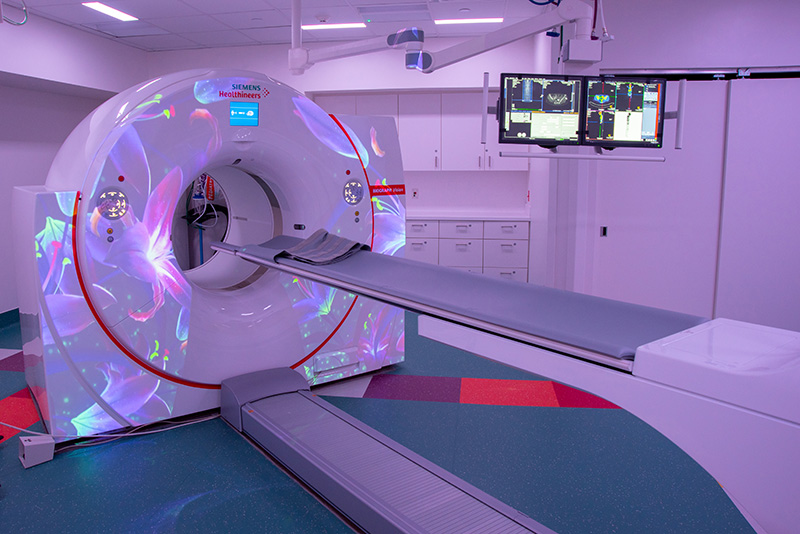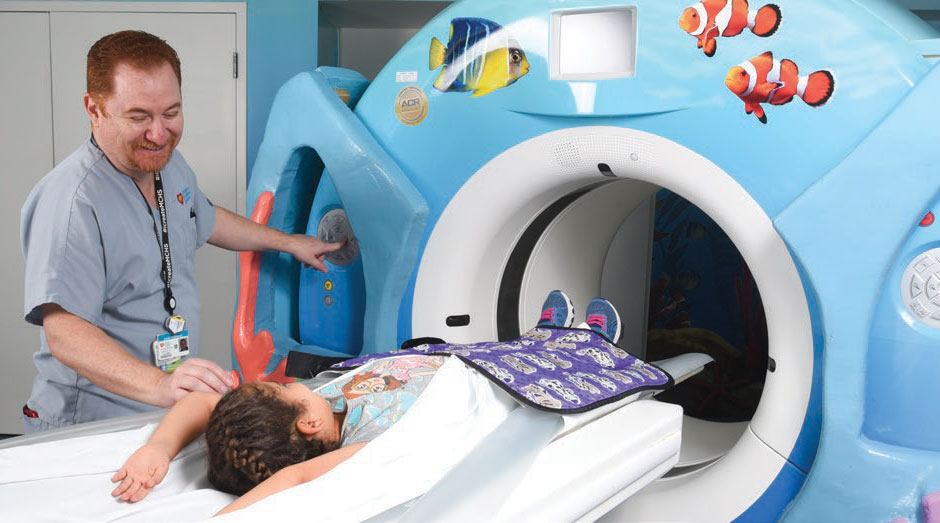The Inflammatory Bowel Disease (IBD) Center, within the Division of Gastroenterology at Nicklaus Children's Hospital, provides comprehensive support and management for children and young adults with Crohn's disease and ulcerative colitis.
The goal is to support children with IBD in attaining remission and optimizing quality of life.
Download Bilingual PDF Booklet
What are Crohn's and Ulcerative Colitis?
- Crohn's disease is a chronic inflammatory bowel disease that affects the lining of the digestive tract anywhere from the mouth to rectum. Crohn's disease can cause abdominal pain, diarrhea, weight loss, anemia and fatigue.
- Ulcerative colitis is a chronic, inflammatory bowel disease that causes inflammation in the lining of the large intestine. Symptoms include rectal bleeding, bloody diarrhea, abdominal cramps and pain.
- The IBD Center at Nicklaus Children's brings together a comprehensive team of experts to support patients and their families in the care journey. The entire team takes part in clinical management to enable your children and young adults to benefit from multispecialty collaboration and consultation. Specialists who collaborate within the IBD Center at Nicklaus Children's include nutritionists, behavioral medicine/ psychologists, pain management experts, child life specialists, social workers and pediatric surgeons.
As part of the comprehensive evaluation, your doctor may prescribe any of the following tests:
- Blood work/laboratory testing: These can include comprehensive metabolic blood panels, vitamin, D, hepatitis B, complete blood count (CBC), C-reactive protein (CRP), liver function, Epstein Barr Virus reactive and quantiferon.
- Skin testing: A skin test, also known as PPD test, may be performed to check for tuberculosis infection.
- Stool collection: Stool tests, including a gastrointestinal panel (GI panel) and cal protein, are important in the diagnosis and monitoring of inflammatory bowel disease.
Radiological Tests

Magnetic resonance imaging (MRI) is an imaging test that provides detailed pictures of the small intestine. Patients may not be able to eat or drink six hours prior to this exam. During this exam, the patient will need to drink a liquid, called oral contrast, and will be asked to walk around so that the contrast can move through the intestines.

Computerized tomography (CT) is a type of imaging scan that takes detailed pictures of the intestine. The patient will drink a liquid (contrast) that allows the doctors to view inside the small intestine. The patient will not be able to eat or drink for 6 to 8 hours before this exam.
The following procedures may also be performed as part of the comprehensive evaluation:
- Esophagogastroduodenoscopy (EGD) with biopsy: This procedure provides the care team with a close up view of the gastrointestinal tract. A flexible tube with a camera on the tip is inserted through the esophagus and is used to view and collect samples of the gastrointestinal tract.
- Capsule endoscopy: During this procedure, a tiny wireless camera takes pictures as is passes through the small intestine. Images are recorded and stored in a device that is worn as a belt around the waist. The care team will remove the belt the next day.
- Colonoscopy with biopsy: This procedure uses a flexible tube with a camera to take images and samples of the bowels. To prepare for this test, the doctor may prescribe stool softeners, enemas and suppositories. For patients who are unable to drink by mouth, a nasogastric tube may be placed through the nose to administer the medications.
Daily Monitoring and Testing
Together with the care team, patients will be monitoring and tracking their food intake, as well as urine and bowel movements, as part of the comprehensive inpatient evaluation. The care team will work with the patient family to gather information such as:
- Daily weight monitoring will be performed before breakfast.
- Food and liquid intake (for children who are able to eat).
- Urine and stool output. The care team will provide families with a special “hat” to place on toilet rim to help collect specimens.
- The care team may place the patient under contact precautions which means the child may not be able to leave the room, room (unless it is for a procedure), until test results are returned and are negative. This can take between 48 to 72 hours).
- Some children will have an intravenous line (IV) to receive fluids for hydration.
- Your doctor may prescribe a bowel rest to give the child's digestive system a break from eating food by mouth. Patients on bowel rest will receive a peripherally inserted central catheter line (PICC) to receive nutrition, called total parenteral nutrition (tpn) and lipids (healthy fats). The PICC line typically stays in place longer than an IV and avoids the need for multiple IV placements. Some patients can have the PICC line placed at the bedside, while others may need to have it placed under anesthesia in the minor procedures suite.
- The doctor may request blood samples to monitor the child's electrolytes, triglycerides, and liver functions. Routine bloodwork can also be drawn from the PICC line.
- Some patients may be able to drink meal replacement shakes. These can be taken by mouth or through a nasogastric tube (NGT).
Diet
If the child can eat by mouth, a dietician will meet with the family to provide information on the types of foods the patient may consume. Dietary modifications may consist of following a low-fiber, low-lactose and/or a sugar-free diet. Families should follow the dietician's recommendations exactly as they are prescribed as this is a critical component of managing IBD.
Medications
Your doctor will discuss which medications or combinations of medications are best for your child.
- Steroids (methylpredinosolone) may be administered through the IV during the hospital stay. Your care team will begin to slowly transition the patient from IV to oral steroids (prednisone). In many cases, diet therapy may replace the need for steroids.
- Your doctor may also prescribe anti-inflammatory medications. They come in the form of oral medications, enemas, suppositories and rectal injectable foams (Mesalmine).
- During the hospital stay, some patients may also begin to receive immunosuppressive medications. These can be administered through IV infusions while others are given through injections. Your doctor will discuss options that best meet your needs.
- A special medication to reduce inflammation and calm the immune system, called methotrexate, may be prescribed, based on the patient's needs. This medication can be taken orally or as an injection.
Supplements
Your doctor will discuss supplements to support your child's individual needs. These may include vitamin D, iron, magnesium and folic acid.
Follow-Up Care
- Patients will have routine bloodwork performed until medication blood levels are within therapeutic range.
- Children will be required to have bloodwork annually to check their vitamin levels and other important factors including quantiferon.
- Stool collections and procedures to monitor the digestive tract and colon will also be prescribed, as needed. • Patients will be referred to a clinical dietician to support the child with his/her dietary needs. Routine imaging, via magnetic resonance imaging (MRI) or CT scan, will be prescribed by your gastroenterologist.
- Routine procedures, including EDGs and/or colonoscopies, may also be be prescribed.
Community Resources
Contact a Member of the Care Team
To reach a member of the Inflammatory Bowel Disease Center or to schedule an appointment please call 786-624-2546.